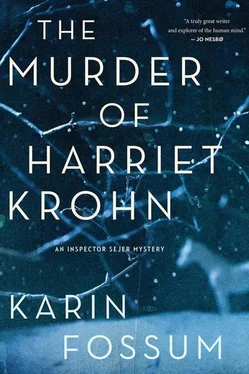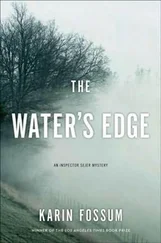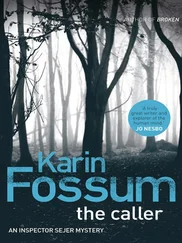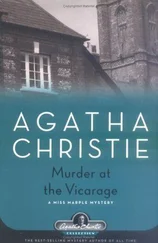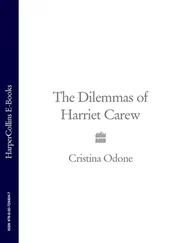“It’s just a matter of getting on with it,” Møller says. “Sometimes they rear and jostle and make a real mess. But I can’t empty the stable, Charlo. We’ll have to take what comes.”
He takes his courage in both hands. He’s marked out where the manger is to go; the old one has been taken down. He makes no comment about the color. It’s so quiet in the stable that he can hear his own breathing and his thumping heart. Then he starts the drill. It doesn’t make much noise before it touches the wall, and then it drones through the entire building. The horses listen with pricked ears. Nothing happens. He stops, has a rest, and looks down the passage. Møller stands, legs apart, and signals that he can continue.
“They’re calm because I’m standing here,” he explains. “I can stay until you’re done. When Julie’s finished riding, you can do the wood shavings in the ring. It’s mucky now. The tractor’s in the outbuilding with the key in the ignition.”
Charlo carries on working and hangs up the four mangers. The bright blue color clashes with the rest of the interior, just as he’d imagined it would. It irritates him. Green would have looked lovely. Afterward he decides to clean out the box for Julie. He wants to be useful. He gets hold of a wheelbarrow and shavings fork; it’s plastic and some of the tines are broken, but he works hard and manages it. The muck is heavy. He sieves the wood shavings through the tines and shovels until he’s hot. He fills up the wheelbarrow and empties it down the hatch. He fetches fresh shavings and gives it two barrowsful. When he’s finished, the box is pleasant and dry. He goes down to look at the tractor. It’s a John Deere. He gets in and turns the ignition key, feeling like a small boy. He walks into the ring to look at Julie. He borrows the yellow blanket and sits down in a chair. He’d like to sit like this forever, watching the two of them at work. Things are good now, Inga Lill, he thinks. We’ve found each other again, and now we’ll always be together. He notices that Julie is practicing reining back. She does it over and over again, sitting back hard in the saddle with a firm touch on the reins, spurring gently. He never tires of watching them.
Will she have dinner with him?
With a smile, she agrees. She covers Crazy with a horse blanket, gives him carrots, and kisses him on the muzzle. Afterward she hangs around in front of his box. She can hardly tear herself away.
“Well,” says Charlo. “He’ll still be here tomorrow.”
Julie goes out to the car with him. They visit the shop and Charlo gets some frozen lasagna. As they drive to Blomsgate, Charlo thinks, I can’t bear to be alone again. When Julie’s with me, I forget about other things. Unpleasant things. Surely I deserve someone. Perhaps there is some justice in this world after all, and I’m no good on my own.
They stamp the snow from their feet on the doormat. Julie pulls off her riding boots and Charlo sets about making the food. Julie isn’t often at his house. She moves around the living room, studying the pictures on the walls and standing at the window looking out.
“Why did you lose your job?” she asks all of a sudden.
Charlo drops what he has in his hands.
“I thought Mom had told you,” he says in an undertone.
“No. For your information, she used to protect you, in spite of everything.”
He can feel his heart again, racing beneath his shirt. He has no choice but to come out with it. Her gaze is inquiring. She’s practically an adult, he thinks, and she has rights.
“I misappropriated money,” he says finally. “A small amount, but they discovered it.”
Julie doesn’t look surprised. Just very serious.
“I was lucky,” Charlo continues and begins slicing bread. “They never reported me. But I was sacked on the spot. It was humiliating,” he adds, “and I’d lost so much of my pride already. It was worse for Mom. I thought it was going to kill her.”
“It did, too,” Julie says tersely. She regards him keenly.
The knife slips out of Charlo’s hand. He gulps.
“Mom died of leukemia,” he says. “They couldn’t do anything.”
“Sorry.” She looks down at the floor with her arms folded.
“I haven’t got much to be proud of,” Charlo says, getting two plates out of the cupboard, “but I am proud of you. You’ve a perfect right to ask questions. I’ll answer them as best I can.”
He opens the oven to look at the lasagna. It’s turned golden on top.
“You are the only thing I’ve produced in my life. A wretched person like me fathering a daughter like you.”
She smiles her bashful smile once more.
“Help me now,” he says. “You can set the table. The meal will be ready soon.”
They eat the hot lasagna in silence. Julie has a Coke with it and Charlo drinks water. He’s going to drive Julie home and he won’t have any alcohol in his blood when he does. From now on, he’s not going to transgress in any way whatsoever. Not as long as he lives. This resolution makes him feel good; it’s like an atonement.
Afterward they do the washing up together. Standing side by side. Charlo enjoys the silence. He gets a chocolate bar out of the cupboard, breaks it into pieces, and puts them in a bowl. They each take a chair and watch the falling snow. Julie picks up the newspaper and starts leafing through it. And Charlo suddenly realizes that she must have read about the Hamsund murder. That she has opinions about it. He’s filled with a sudden curiosity. What kind of expression would she assume if he were to mention it? Quite at random, just in passing. Have you heard about that murder at Hamsund? He clenches his teeth. Hold your tongue! a voice inside him says. It’s as if the murder is pressing inside him. The pressure is rising in his chest and all the way up to his mouth, where his tongue lies ready to form words. Julie skims on. Charlo sits watching her. She’s so like Inga Lill, but her features are softer. Even so, she displays the same acuteness that her mother had, a need to get to the bottom of things. Suddenly she looks up at him.
“Have you seen this article?” she asks, holding up the paper. “This Inspector Sejer, the policeman who’s leading the Hamsund murder case, hasn’t had a single unsolved murder in his whole career. And he’s over fifty. What about that?”
Charlo turns pale. He certainly hasn’t read the article and he can’t understand how he missed it.
“Oh, really?” he says doubtfully. She looks down at the text again, and he’s glad she can’t see his face because now it’s as rigid as papier-mâché.
“That would be funny,” she says. “If the people who did it read the paper. Think of the panic. Not a single unsolved case.”
Charlo slumps in his chair. He searches for words, but they stick in his throat. Suddenly she looks up at him. Takes a piece of chocolate, chews it with her sharp teeth.
“You’re looking tired,” she teases. “You’re not used to real work, Dad.”
Charlo runs a weary hand across his face. Yes, he’s tired. He’s got to watch out the whole time, forever guarding his words. He clings to this smidgeon of tenderness, that she’s noticed he’s tired. Yes, he’s tired. He feels a lot older than he actually is. It’s like walking on thin ice: he hardly dares put his feet down, or make sudden movements, or raise his voice, for fear that someone might notice him and single him out in the crowd. Not a single unsolved case. It’s disturbing. Julie puts the paper down.
“I must go back and do some homework,” she says.
He nods, looks surreptitiously at the paper, and thinks about getting ready to drive. She vanishes into the hallway and returns with her riding boots.
“You’ve got all that shoe polish and stuff in the kitchen. I’ll just go over my boots before we go, and then it’ll be done. Is it still in the chest?”
Читать дальше
